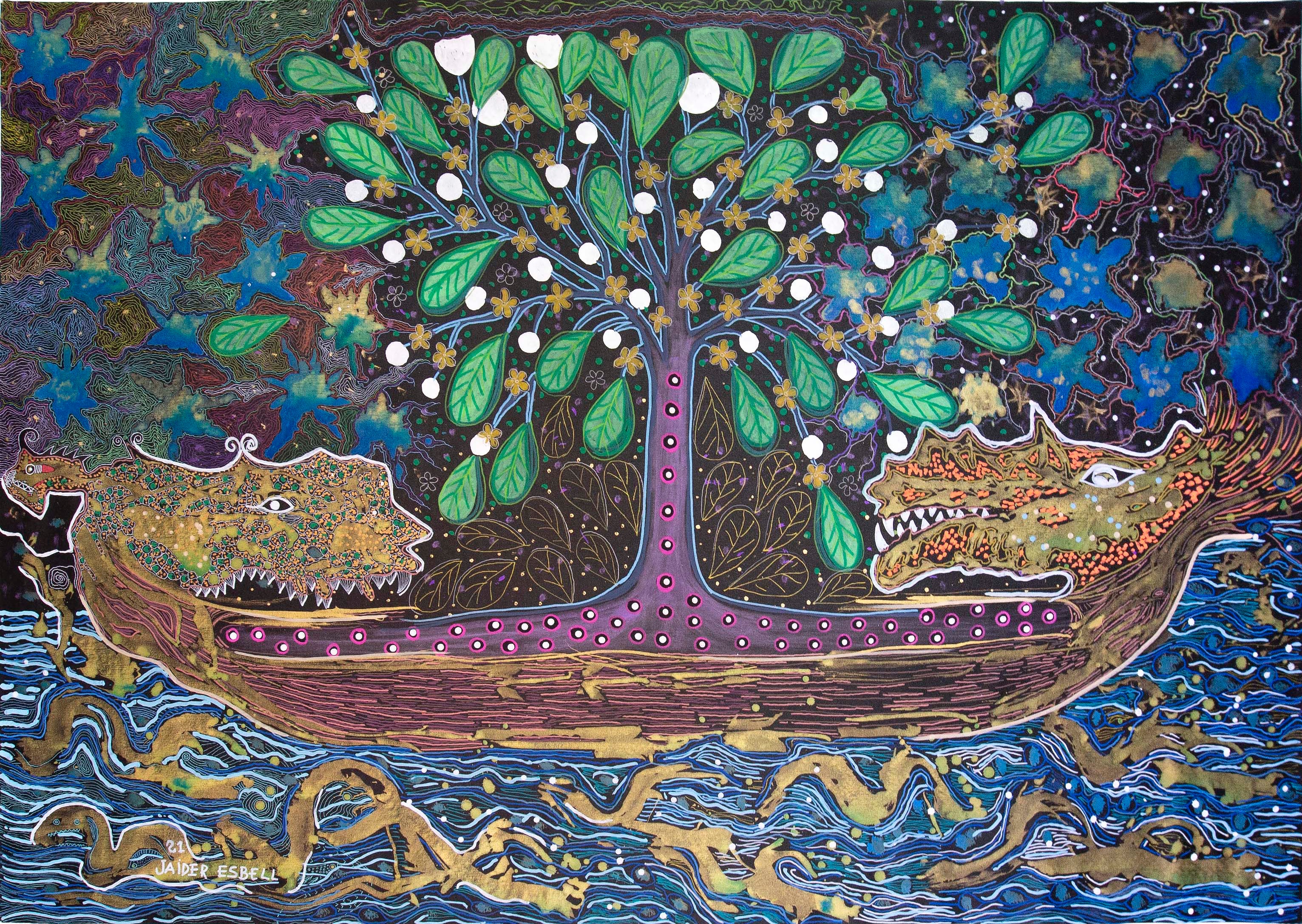‘The Royal Road to the Colonial Unconscious’: Psychoanalysis, Cannibalism, and the Libidinal Economy of Colonialism
Conteúdo do artigo principal
Resumo
Neste artigo, exploro a economia libidinal do colonialismo sob a perspectiva do canibalismo (como fantasia ocidental sobre o outro exótico e subumano). Para isso, sigo de perto as referências ao canibal no arsenal de tropos literários anticoloniais e em dois poemas de Oswald de Andrade e Aimé Césaire. Embora a identificação anticolonial com o canibal engendre o potencial de uma reapropriação ameaçadora do que foi roubado colonialmente, mostro que algo deixa de ser reconhecido nessa identificação melancólica. Em seguida, volto-me para o trabalho de Octave Mannoni, que vê o canibal como uma metáfora para o esmagador complexo de dependência do colonizado. Analisando a díade colonial sob a ótica dos complexos de personalidade, Mannoni fixa o colonizador e o colonizado em uma dinâmica de poder e, embora aborde a dimensão psicológica do colonialismo, a reduz ao nível de um conflito interpessoal. Finalmente, volto-me para a obra de Frantz Fanon para mostrar o que uma leitura psicanalítica da economia colonial libidinal pode oferecer: enfatizando as conotações sexuais encerradas na fantasia canibalística, Fanon expõe a visceralidade do racismo colonial como um desejo de devorar e aniquilar o colonizado. Na obra de Fanon, a psicanálise surge como uma ferramenta potente que expõe a dinâmica inconsciente das fantasias sexuadas e raciais e, como tal, parece ser indispensável para o pensamento decolonial.
Downloads
Detalhes do artigo

Este trabalho está licenciado sob uma licença Creative Commons Attribution-NonCommercial 4.0 International License.
Autores que publicam nesta revista concordam com os seguintes termos:
Autores mantém os direitos autorais e concedem à revista o direito de primeira publicação, sendo o trabalho simultaneamente licenciado sob a Creative Commons Attribution License o que permite o compartilhamento do trabalho com reconhecimento da autoria do trabalho e publicação inicial nesta revista.
Autores têm autorização para assumir contratos adicionais separadamente, para distribuição não-exclusiva da versão do trabalho publicada nesta revista (ex.: publicar em repositório institucional ou como capítulo de livro), com reconhecimento de autoria e publicação inicial nesta revista.
Autores têm permissão e são estimulados a publicar e distribuir seu trabalho online (ex.: em repositórios institucionais ou na sua página pessoal) a qualquer ponto antes ou durante o processo editorial, já que isso pode gerar alterações produtivas, bem como aumentar o impacto e a citação do trabalho publicado.
Referências
Andrade, Oswald de. “Canibalist Manifesto.” Translated by Leslie Bary. Latin American Literary Review 19, no. 38 (1991): 38–47.
Arens, Walter. The Man-Eating Myth. 1st ed. New York: Oxford University Press, 1979.
Barker, Francis, Peter Hulme, and Margaret Iversen. Cannibalism and the Colonial World. New York: Cambridge University Press, 1998.
Bhabha, Homi K. “Of Mimicry and Man: The Ambivalence of Colonial Discourse.” The MIT Press, October, 28, no. Discipleship: A Special Issue on Psychoanalysis (Spring 1984): 125–33.
Biber, Katherine. “Cannibals and Colonialism.” Sydney Law Review 26, no. 4 (2005): 623–37.
Bonaparte, Marie. Female Sexuality. Translated by John Rodker. New York: Grove Press, 1953.
Césaire, Aimé. Notebook of a Return to My Native Land. Translated by Mireille Rosello and Annie Pritchard. Newcastle-upon-Tyne: Bloodaxe Books, 1995.
Césaire, Aimé. . The Original 1939 Notebook of a Return to the Native Land. Translated by John Eshleman and James A. Arnold. Connecticut: Wesleyan University Press, 2013.
Davis, Gregson. Aimé Césaire. Cambridge UK: Cambridge University Press, 1997.
Fanon, Frantz. Black Skin, White Masks. 2nd ed. London: Pluto Press, 1986.
Fanon, Frantz. “The ‘North African Syndrome.’” In Toward the African Revolution: Political Essays, translated by Haakon Chevalier, 3–16. New York: Grove Press, 1967.
Gibson, Nigel. “Thoughts about Doing Fanonism in the 1990s.” College Literature 26, no. 2 (1999): 96–117.
Gilroy, Paul. The Black Atlantic: Modernity and Double Consciousness. London: Verso, 1993.
Hook, Derek. A Critical Psychology of the Postcolonial: The Mind of Apartheid. London and New York: Psychology Press, 2012.
Hook, Derek. “Fanon and Libidinal Economy.” In Re(Con)Figuring Psychoanalysis: Critical Juxtapositions of the Philosophical, the Sociohistorical and the Political, edited by Aydan Gülerce, 164–84. New York and London: Palgrave Macmillan, 2012.
Hulme, Peter. Colonial Encounters: Europe and the Native Caribbean, 1492-1797. London: Methuen, 1986.
Khanna, Ranjana. Dark Continents: Psychoanalysis and Colonialism. Durham and London: Duke University Press, 2003.
Kilgour, Maggie. From Communion to Cannibalism: An Anatomy of Metaphors of Incorporation. New Jersey: Princeton University Press, 1990.
Lane, Christopher. “Psychoanalysis and Colonialism Redux: Why Mannoni’s ‘“Prospero Complex”’ Still Haunts Us.” Journal of Modern Literature 25, no. 3/4 (2002): 127–49.
Lauretis, Teresa de. “Difference Embodied: Reflections on Black Skin, White Masks.” Parallax 8, no. 2 (2002): 54–68.
Lebeau, Vicky. “Children of Violence.” In Black Skin, White Masks: New Interdisciplinary Essays, edited by Max Silverman, 128–45. Manchester and New York: Manchester University Press, 2005.
Madureira, Luís. Cannibal Modernities: Postcoloniality and the Avant-Garde in Caribbean and Brazilian Literature. U.S.A: University of Virginia Press, 2005.
Mannoni, Octave. Prospero and Caliban: The Psychology of Colonization. Translated by Pamela Powesland. London: Methuen & Co, Ltd, 1956.
Mannoni, Octave. “The Decolonisation of Myself.” Race VII, no. 4 (1966): 327–35.
Mbembe, Achille. “The Society of Enmity.” Radical Philosophy, 1, no. 200 (2016): 23–235.
McCulloch, Jock. Black Soul White Artefact: Fanon’s Clinical Psychology and Social Theory. London and New York: Cambridge University Press, 1983.
Obeyesekere, Gananath. Cannibal Talk: The Man-Eating Myth and Human Sacrifice in the South Seas. U.S.A: University of California Press, 2005.
Sadlier, Darlene J. Brazil Imagined: From 1500 to the Present. Austin, Texas: University of Texas Press, 2008.
Schwarz, Roberto. “Brazilian Culture: Nationalism by Elimination.” Translated by Linda Briggs. New Left Review I, no. 167 (1988): 77–90.
Walton, Jean. Fair Sex, Savage Dreams: Race, Psychoanalysis, Sexual Difference. Durham and London: Duke University Press, 2001.
Wilder, Gary. Freedom Time: Negritude, Decolonization and the Future of the World. Durham and London: Duke University Press, 2015.

